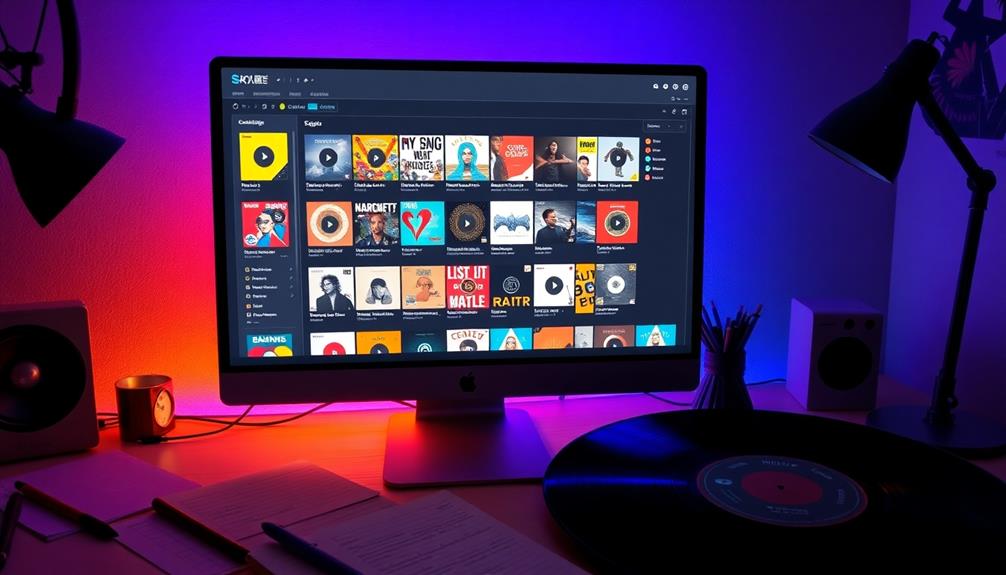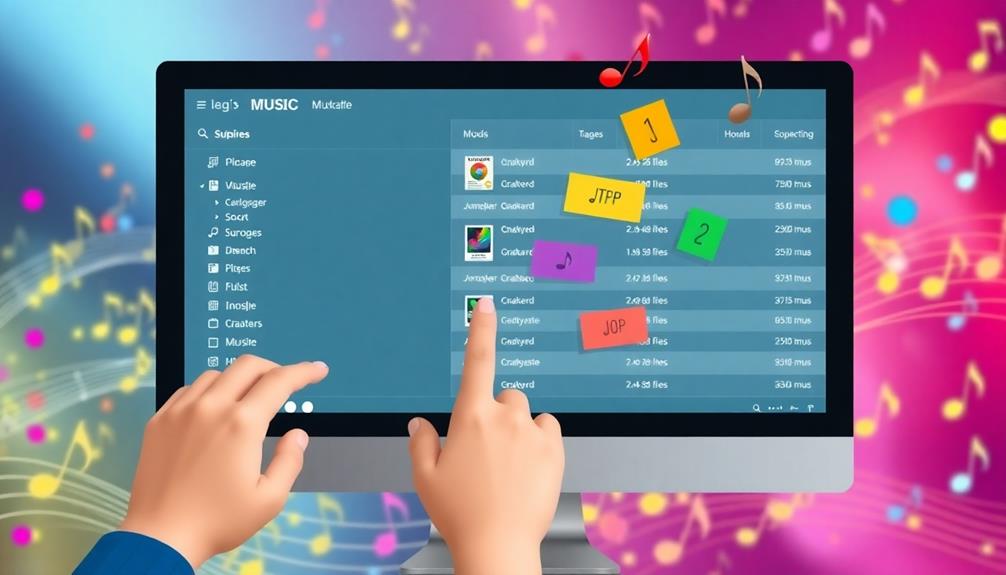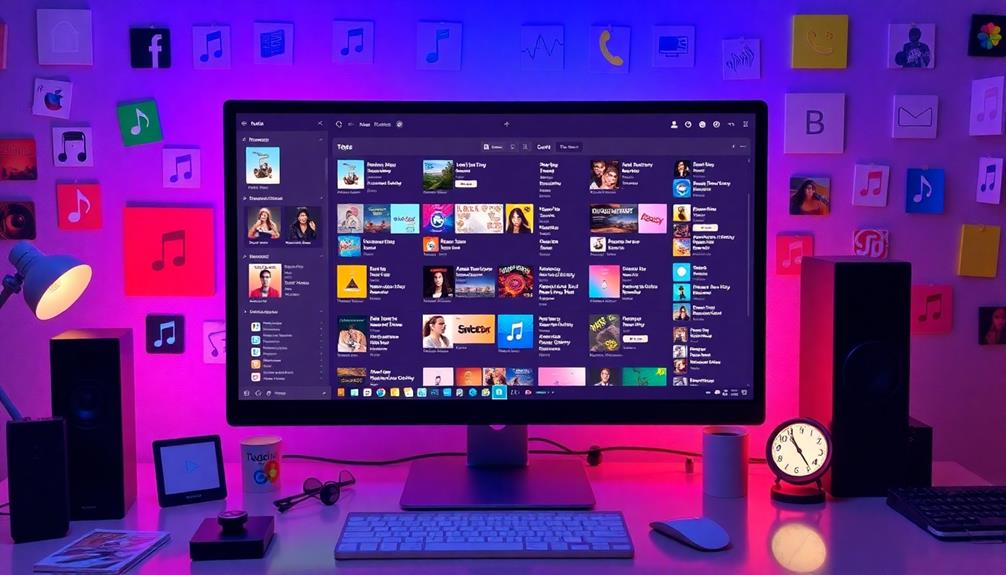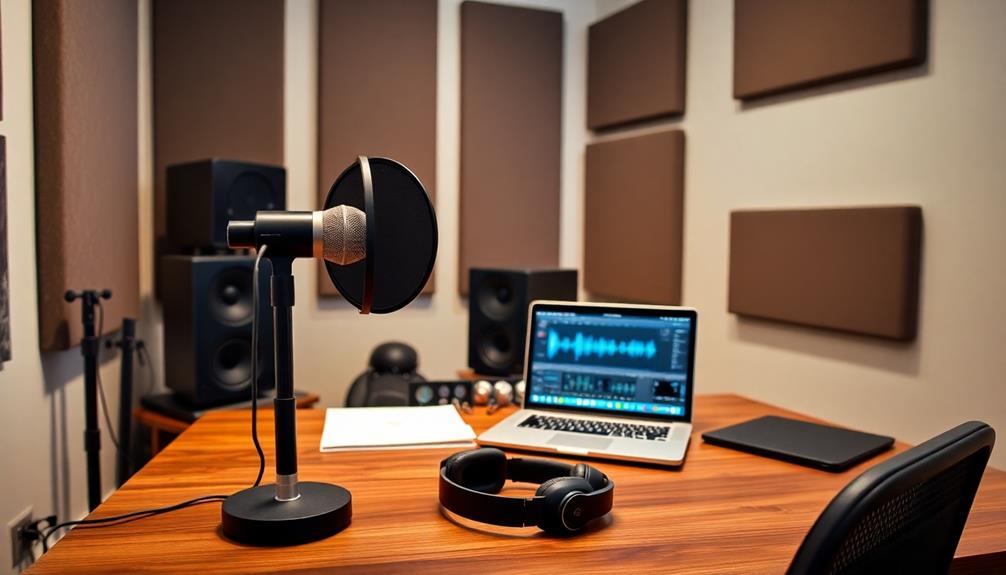To use metadata for organizing your music files, start by tagging each track with accurate information like artist name, album title, and genre. This makes searching and sorting much easier. You can use tools like MusicBrainz Picard or Mp3tag to automate tagging and manage metadata effectively. Maintain a consistent file naming convention and regularly check for duplicates. Create themed playlists using metadata tags for a more enjoyable listening experience. By following these steps, you'll streamline your music library organization and enhance your overall experience. There's plenty more to explore, so keep going to optimize your music collection further!
Key Takeaways
- Utilize specialized software like MusicBrainz Picard or Mp3tag for efficient metadata management and tagging processes.
- Implement consistent file naming conventions to enhance searchability and organization of music files.
- Regularly update and audit metadata to maintain an accurate and clutter-free music library.
- Create themed playlists by utilizing metadata tags for enhanced listening experiences and easy access.
- Perform periodic backups of your music library to prevent data loss and maintain integrity over time.
Importance of Metadata in Music Organization

When you immerse yourself in your music collection, the significance of metadata becomes immediately clear. Metadata includes essential details like artist name, album title, genre, and track number, which are vital for effective organization of your music files. Without accurate metadata, finding a specific song in your music library can feel like searching for a needle in a haystack.
With well-tagged metadata, you can automate the organization of your music library, sorting tracks by artist names, album titles, or genres with ease. This streamlined organization not only saves you time but also enhances your overall listening experience as you can quickly access curated playlists.
Tools like MusicBrainz Picard and Mp3tag can assist you in batch editing and tagging your music files, making the organization process even more efficient. Properly tagged metadata improves searchability, allowing you to locate specific tracks or albums in a flash.
Steps to Tag Your Music Files

Tagging your music files doesn't have to be an intimidating task; it can actually be quite straightforward with the right tools. Start by choosing software like Mp3tag or MusicBrainz Picard to easily edit and manage your music metadata. These tools allow you to adjust important details like artist name, album title, and track number.
Next, guarantee consistent file naming conventions, such as '%artist% – %album% – %title%', to facilitate easier searching and organization. You can also utilize the 'Lookup' feature in Picard to automatically retrieve and tag metadata from the MusicBrainz database, enhancing accuracy.
Here's a simple guide to help you:
| Step | Action | Purpose |
|---|---|---|
| 1. Choose software | Use Mp3tag or MusicBrainz Picard | To edit and manage metadata |
| 2. Consistent naming | Follow a naming convention | For easier searching |
| 3. Use Lookup feature | Automatically retrieve metadata | To enhance accuracy |
| 4. Regular updates | Check and update metadata | To maintain organization |
Organizing Files Using Metadata

Organizing your music files effectively starts with accurate tagging.
By ensuring each file has the right details like artist name and album title, you'll make searching and sorting a breeze.
Additionally, considering the top projectors for gaming enthusiasts can enhance your overall media experience.
Choosing the right tools for this task can streamline the process and keep your library neat and accessible.
Importance of Accurate Tagging
Accurate tagging transforms your music library into an easily navigable collection, allowing you to quickly find tracks by artist, album, genre, or track number. When you focus on accurate tagging, you're leveraging metadata to enhance the organization of your music files. This efficient sorting method not only saves you time but also enriches your listening experience.
With precise metadata, you'll minimize the chances of duplicate entries and misfiled songs, leading to a cleaner music library that's easy to explore. Imagine creating themed playlists or genre-specific collections without the hassle of searching for misnamed tracks. Accurate tagging allows this, enabling you to craft playlists effortlessly.
Moreover, maintaining consistent metadata helps preserve the quality and integrity of your music collection over time. As your library grows, effective organization becomes essential, and accurate tagging lays the foundation for this.
It's the backbone of automated sorting processes in software that manage your files, ensuring they're arranged correctly in designated folders. By prioritizing accurate tagging, you'll enjoy a more streamlined music library, making your listening experience all the more enjoyable.
Tool Selection for Organization
Selecting the right tools can make all the difference in managing your music library efficiently. For effective tool selection for organization, consider using specialized software that focuses on metadata attributes.
Here are three tools that stand out:
- MusicBrainz Picard: This tool excels in automatically matching your music files with existing metadata in the MusicBrainz database. Its lookup features streamline the tagging process, saving you time.
- Ex Falso: With customizable renaming capabilities, Ex Falso lets you define how your files are organized. You can use the Preview function to see changes before applying them, ensuring your library stays organized.
- Directory Structure: Establish a consistent directory structure, like Music/Artist Name/Album Name/Song.mp3. This makes it easy to retrieve files and enhances your overall organization.
Tools for Managing Metadata

When it comes to managing your music metadata, effective tagging software can make a world of difference.
Tools like MusicBrainz Picard and Ex Falso simplify organization techniques by allowing you to retag and rename files effortlessly.
Effective Tagging Software
Managing your music library effectively hinges on using the right tagging software to handle metadata. With the right tools, you can efficiently organize music files and enhance your listening experience.
Here are three effective tagging software options you shouldn't overlook:
- Mp3tag: This popular software allows you to edit metadata fields like artist, album, and track title easily. It's perfect for ensuring your music files are well-organized.
- MusicBrainz Picard: By integrating with the MusicBrainz database, this tool automatically tags and organizes your music files based on their metadata. It makes the process user-friendly and accurate, saving you valuable time.
- Ex Falso: This versatile software offers advanced retagging capabilities. You can rename and reorganize your music files based on customizable metadata criteria.
Both Mp3tag and MusicBrainz Picard provide features for automated file renaming, considerably reducing the time you spend on manual organization.
Regularly updating your metadata using effective tagging software will help maintain an accurate and consistent music library, making your listening experience more enjoyable.
Metadata Organization Techniques
Effective organization of metadata is essential for maintaining a well-structured music library. You can utilize metadata management software like MusicBrainz Picard and Ex Falso to accurately retag and rename your music files. A consistent file naming convention, such as "%artist% – %album%/%title%," helps you easily organize music files for quick access.
Here's a quick reference table to help you understand different techniques:
| Technique | Description | Benefits |
|---|---|---|
| Consistent Tagging | Use the same format for all audio file metadata. | Enhances searchability and clarity. |
| Automate Renaming | Leverage tools like Picard to rename files automatically. | Saves time and reduces errors. |
| Regular Auditing | Regularly check your library for duplicates. | Maintains organization and accuracy. |
| Lookup Features | Use database lookups to fill in missing metadata. | Guarantees you have correct information. |
Creating Playlists for Better Access

Creating playlists can transform your music experience, making it easier to access the songs you love. By utilizing metadata, you can organize your collection of music files into themed playlists that enhance your listening pleasure.
Here are three effective ways to do it:
- Curate by Genre or Mood: Use metadata tags to create playlists for different vibes, whether it's a workout, a party, or a chill evening. This guarantees you have the right soundtrack for every occasion.
- Leverage Music Management Software: Programs like iTunes or MusicBee allow you to easily create and organize playlists based on metadata. This makes accessing your favorite tracks seamless and efficient.
- Update Regularly: As you expand your music library, regularly refresh your playlists with new tracks. Use the metadata to quickly identify songs from your favorite artists that fit your current playlists.
Don't forget to share your curated selections with friends or on social media. Highlight featured artists or genres using metadata to help others discover your music gems.
Organizing your playlists this way will elevate your listening experience!
Maintaining Your Organized Music Library

Keeping your music library organized is just as important as curating those playlists. To maintain that order, regularly update the metadata for any new additions. This guarantees accurate categorization and easy retrieval of your favorite songs.
Use music management software to automate this process, allowing you to organize files by artist, album, and genre effortlessly.
Periodically audit your music files to identify and delete duplicate tracks. This helps reduce clutter and keeps your collection streamlined. Establish a routine for these audits, so you can stay on top of any unnecessary duplicates.
Don't forget the importance of backups. Frequently back up your organized music library using external hard drives or cloud storage solutions to protect against data loss. This way, your hard work is secure.
Frequently Asked Questions
What's the Best Way to Organize Music Files?
To organize your music files effectively, create a consistent naming convention, sort by genre or artist, and establish a structured directory. Regularly update your files to maintain clarity and prevent clutter in your library. To further streamline your music library, consider using metadata tags to embed essential details such as track title, album name, and release year directly within each file. This practice makes it easier to search and sort your collection, especially when working across different platforms. Additionally, implementing file naming tips for any DAW can help ensure compatibility and reduce confusion, particularly when collaborating with others or managing large projects.
What Metadata Should I Include in My Music?
You should include essential metadata like artist name, album title, track number, and song title. Adding genre tags, year of release, and album art enhances organization and improves your overall music library experience.
How to Create Music Metadata?
Ever wonder how your favorite songs get their detailed info? To create music metadata, use software like Mp3tag, fill in artist names and album titles, and guarantee consistency for a tidy, organized collection.
What Is the Use of Metadata in Digital Audio Files?
Metadata in digital audio files helps you identify and organize your music easily. It includes details like artist names and genres, enabling you to search, sort, and create playlists that enhance your listening experience effortlessly.
Conclusion
By leveraging metadata, you can transform your chaotic music library into an organized treasure trove of tunes. Did you know that nearly 80% of people listen to music daily? With the right tagging and organization, you'll easily access your favorite tracks and discover new ones. So, take the time to implement these strategies, and enjoy a seamless listening experience. Your music deserves to be just as enjoyable as the memories it creates!










